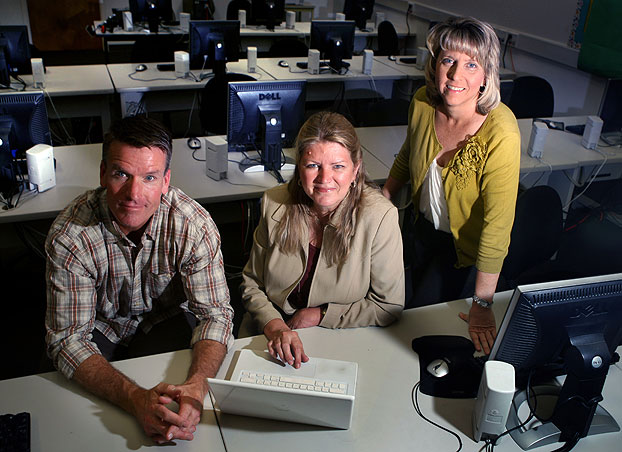 Caption: College of Education faculty members Chris Street, from left, professor
of secondary education, Ula Manzo, chair and professor of reading and
Kimberly A. Norman, professor of elementary and bilingual education,
are overseeing the new online master’s in education degree programs
launched this fall semester. Photo by Karen TapiaDownload Photo
Caption: College of Education faculty members Chris Street, from left, professor
of secondary education, Ula Manzo, chair and professor of reading and
Kimberly A. Norman, professor of elementary and bilingual education,
are overseeing the new online master’s in education degree programs
launched this fall semester. Photo by Karen TapiaDownload Photo
Virtual Learning
New Online Master’s Programs Available for K-12 Teachers
For K-12 educators seeking advanced teaching degrees from a traditional university, the College of Education has made it a little easier — by turning to the Internet.
This fall, the college is offering four online new concentrations in their master of education program — eliminating distance barriers for potential graduate students — in educational technology, elementary curriculum and instruction, reading and secondary education.
“Most of our students are working adults who need the flexibility provided by online programs, and increasingly, they are very comfortable using technology in work and in their personal lives,” said Claire Cavallaro, dean of the College of Education. “By offering master’s degree programs online, we are able to make our high-quality, rigorous graduate programs accessible to students who would not otherwise be able to take advantage of what Cal State Fullerton has to offer.”
Cal State Fullerton alumna and Fullerton teacher Heather Kelley enrolled in the educational technology program to learn about advancements in her field.
“I was interested in the online master’s program because of the freedom it offers me to learn on my own time,” said the Yorba Linda resident who teaches technology and interventions at Commonwealth Elementary School. “Through this program, I hope to gain a better understanding of the technologies that are being used in schools today. Already, I have learned so much, and now I understand not only why specific programs are used, but also how they are created to help and improve student learning.”
Program Specifics
The online graduate programs are equivalent in quality and coursework to what is currently offered in face-to-face classes, said Karen Ivers, associate dean of the College of Education. They are fully accredited by both the Western Association of Schools and Colleges and the National Council for Accreditation of Teacher Education.
Courses are taught and overseen by College of Education faculty members using various techniques to interact and engage with students comparable to a classroom setting, said Ivers who added that most of the master’s candidates enrolled in the programs are credentialed teachers who have the basic technological, time management and organizational skills to be successful in an online program.
The master’s program in education with a concentration in elementary curriculum and instruction, completed in 24-28 months, is designed to help classroom teachers advance their skills, become informed about new practices and research and prepare for curriculum and instructional leadership roles, said Kimberly A. Norman, professor of elementary and bilingual education.
The M.S. in education with a concentration in educational technology, completed in 16 months, helps meet the demand for individuals with advanced training in integrating innovative technologies into curriculum and instructional multimedia development. Teachers in the program examine ways to use technology to help all students learn, as well as learn to be technology leaders in their schools and districts, Norman said.
The five-semester online reading program prepares teachers to develop, supervise and evaluate reading programs from pre-K through adult levels, said Ula Manzo, chair and professor of reading. “The online curriculum provides a strong grounding in research-based theory and pedagogy, paired with supervised field work. The online option also offers individuals to use their time the most efficiently by interacting with professors and classmates online and eliminating the time and stress of travel to and from classes.”
With the online master’s in education program, concentration in secondary education, middle school and high school teachers can complete the program in 21 months, said Chris Street, professor of secondary education. “Our program is designed to help career secondary classroom teachers upgrade their skills, become informed about new ideas and research in secondary teaching and prepare for curriculum leadership roles in public and private schools.”
Sept. 21, 2010
